- Home
- Alison Weir
The Tower Is Full of Ghosts Today Page 4
The Tower Is Full of Ghosts Today Read online
Page 4
‘If he insists that you remove the veil, Highness, remember what I taught you about custody of the eyes,’ Doña Elvira said, her voice cold. ‘Keep them demurely downcast, as befits a virtuous maiden! Do not stare.’
In a trice Katherine was ready, the veil in place, and Maria gave her a mischievous smile and sped down the stairs to make her curtsey and invite the King to come up to her mistress’s chamber.
In a moment, just a heartbeat, Katherine would come face to face with her destiny. And here, entering her chamber, was the debonair Count de Cabra, bowing and obsequious, and with him a tall, middle-aged man in riding clothes, booted and cloaked against the cold. His face was angular, his nose a prominent beak, his greying sandy-brown hair sparse on his fur collar, and he was regarding her almost greedily with shrewd eyes. His rich furs and velvet bonnet with its jewelled ornament left her in no doubt that this was His Grace King Henry VII of England, first sovereign of the House of Tudor. She sank to her knees, her attendants following her example.
‘Welcome to my kingdom, Princess Katherine,’ the King said. As the Count translated, Henry stepped forward, took her hands and raised her to her feet. His voice was high but manly, almost musical. She had been told that he had Welsh blood from his father’s ancestors, and the Welsh were renowned as a musical race.
Before Katherine could reply, the King let go of her hands and raised her veil – and smiled.
‘The ambassadors of the sovereigns have not lied,’ he said delightedly. ‘I had heard of the wealth of Spain, but here is her most priceless treasure. Your Highness is doubly welcome for your beauty and your pretty face.’ He lifted her hands and kissed them, as Don Pedro Manrique translated his words.
‘I thank your Grace,’ Katherine said, reciting the sentence she had practised earlier. Ignoring the stony-faced Doña Elvira, she ventured a smile.
‘They told me you did not look like a true Spaniard,’ Henry told her. ‘By your red hair, you are a Lancastrian, like me and Arthur. By God, you look as English as we do! The kinship is plain, for we all descend from old John of Gaunt and King Edward the Third! I could not have found a more fitting match for my son.’
‘I am very proud of my English royal blood,’ Katherine said in Spanish. ‘I am named for my great-grandmother, Catalina of Lancaster.’
‘Gaunt’s own daughter! Well, well. But you must not let an old man keep you from your husband!’ the King declared jovially, stepping aside to reveal a youth standing in the doorway, flanked by several lords.
Katherine’s first reaction was dismay, although she took care to keep smiling. It was the boy in the picture, grown slightly older, yet different. Prince Arthur was tall and auburn haired, like his father, and had the air of confidence that was customary in those born of princely rank, but the thinness of his limbs was not concealed by his heavy travelling clothes. They hung on him. Even in the candlelight she could see that his cheeks were not rosy at all, but white with a ruddy flush.
Again she knelt. Arthur gave her an uncertain smile, bowed courteously and raised her to her feet. His hands were colder than hers. Then he bent to brush her lips briefly with his, just as she had seen people doing in Plymouth. She had been told since that it was the custom in England. She dared not look at Doña Elvira.
Speaking in Latin, Arthur asked her if she had had a pleasant journey. His voice was light and melodious. She assured him, in the same language, that she had.
‘I have been received warmly and made welcome everywhere in England,’ she said.
‘I heard that your Highness had nearly been shipwrecked,’ Arthur said. ‘We were all much alarmed, and relieved when we had news that you had made land safely.’
‘It was a frightening experience,’ Katherine told him, searching his face for some spark of warmth, some indication that he found her appealing.
‘Well, you are here now,’ Arthur replied. They smiled awkwardly at each other, for want of anything else to say, until the King rescued them, calling for wine to celebrate this happy meeting and talking about the lavish wedding celebrations he had planned.
Arthur said little. Although he politely asked if she had been comfortably accommodated, and what she thought of the food in England, and other such pleasantries, Katherine was unnerved by his reserve. Compared to King Henry’s hearty welcome, her husband’s had been lukewarm. She thought of the letters he had sent, so full of longing for her coming. It was hard to believe now that he had written them. Her heart plummeted. Was he disappointed in her? She could detect no ardour in him, none of the passion her brother Juan had shown from the first towards his bride. But she could see something in Arthur that she had seen, belatedly, in Juan – the signs of ill-health. Indeed Arthur looked so poorly that she feared he was ailing from some dread disease. Yet this was the young man it was her duty to love, as her husband. Her mother had said that it was up to her to win his love.
‘You must be tired after your journey here, sir,’ she said, thinking the Latin sounded very stilted and resolving again to learn English as quickly as she could. ‘It’s cold, and the ground must be hard for riding.’
‘I am freezing to my bones, your Highness,’ Arthur admitted. ‘I expect you find England very cold after Spain.’
‘I do, but already I have grown to love England,’ Katherine replied. It was not wholly truthful, for she had seen little of the country on her long journey, enclosed in her litter, with only occasional peeps when the curtains gaped – but it was politic, and one day, God willing, it would be true. ‘Come to the fire, my lord,’ she invited, noticing the King watching them approvingly as they walked together across the room. Arthur accepted a glass of wine, sipped it and coughed.
‘Is your Highness quite well?’ Katherine asked.
‘A winter rheum, nothing more,’ he replied, coughing again.
‘Then I hope you will soon be better!’ she said brightly.
‘Your Highness is most kind,’ Arthur said. ‘Forgive me if I did not welcome you as warmly as I should have done. I was tired by the ride to and from Easthampstead, where I met up with the King my father. I will be more myself soon, and better company, I hope. I am pleased that you are here.’ He flushed, and Katherine warmed to him. She had mistaken weariness and perhaps shyness for indifference. Suddenly the world had shifted again. Everything was going to be all right.
It was midnight before everyone retired. Katherine had enjoyed herself immensely. At the King’s request, she had summoned her musicians to entertain him and Arthur, and to the melodic sound of hautboys and sackbuts, she and her ladies had danced the slow, stately pavaniglia with its two beats to a step. Arthur, somewhat restored after the wine and sweetmeats, wanted to join in, so she and her ladies taught him a dignified baja. Afterwards, as everyone clapped, he raised her hand to his lips and kissed it.
When he took his leave the next morning, he looked a little better.
‘Farewell, my lady,’ he said, still speaking Latin. ‘I look forward to seeing you in London.’ He bent to kiss her hand, bowed to her curtsey, and walked off to join his father and their retinue. Her heart went out to him, poor, thin, sickly boy. She sent up a prayer that God would soon restore him to health.
The young woman who changed the course of history.
Fresh from the palaces of Burgundy and France, Anne draws attention at the English court, embracing the play of courtly love.
But when the King commands, nothing is ever a game.
Anne has a spirit worthy of a crown – and the crown is what she seeks, at any price. And as she embarks on her perilous course, a kingdom risks being torn apart.
Anne Boleyn. The second of Henry’s queens.
Her story.
Turn the page to read the first chapter . . .
Available in Ebook and Hardback now.
Available in Paperback in early 2018.
Chapter 1
1512
Her skin was rather sallow, Anne thought as she studied herself in the silver mirror, and she had too many moles, but at least her face was a fashionable oval. At eleven she had no womanly figure to speak of, but that hopefully would change in the next year or so. Mary, after all, was already buxom at thirteen.
She drew back, considering herself. People had often said, within her hearing, that Mary was the more beautiful of the two Boleyn sisters. Yet they were both brunettes, with long glossy hair, high cheekbones and pointed chins, and both slender and graceful, for the deportment fit for royal courts had been drummed into them. So what was it that made a girl beautiful? What made the arrangement of Mary’s features better than hers? It had begun to bother Anne, now that she was growing up and was constantly being enjoined to prepare herself for a glorious future in which royal favour and a wealthy husband of rank loomed large.
Maybe it was the moles and the sallow skin. The sallowness could be rectified by a lotion of powdered egg whites and alum. At least she had a pretty mouth, and the black eyes that her Grandmother Butler always said were her best feature.
‘And you know already how to use them for effect, child.’ Anne had not quite understood what that meant, but then Grandmother was Irish and a little fey and often said some startling things. Everyone tolerated it because she had been a great heiress and one of the chief sources of the family fortunes.
Anne propped up the mirror on a chest and twirled in front of it. She did look good in the green gown, which made her waist seem so slender. The dark colour became her too. The only thing that was wrong was the cut of the sleeves, which were tight to the wrist and did not cover the deformity of which she was always so painfully aware. She was forever curling it into her palm, the little finger o
f her right hand, so that none should see the tiny extra nail. If only she could have a gown with hanging sleeves that would cover it! But Mother said it was foolish to worry about such a little thing. It was not a little thing to Anne, and it had loomed larger than ever since the day when Mary, bested in one of their interminable arguments, had called it a witch’s mark.
Anne pushed the hateful memory aside. She would not dwell on it on this beautiful late-summer day. She had a free hour before her lesson with the chaplain, and was determined to waste not a minute of it. In a trice she had summoned her maid, changed into her everyday worsted, descended the stairs and crossed the stone drawbridge across the castle moat; then she picked up her skirts and ran through the gardens into the meadows by the River Eden, where she loved to wander.
From here she had a grand view of moated Hever Castle, her family’s seat, and the lush wooded Kentish countryside that cradled it. But of greater interest was the sight of her beloved brother George lying sprawled in the grass, twanging his lute, his dark brown hair tousled, his clothes crumpled.
‘They are looking for you indoors,’ she told him, kneeling down. ‘You should be at your books. You’ll be beaten if you don’t go back.’
George grinned up at her. ‘I had an idea for a song. Listen!’
He played well for a boy of nine, and his composition had the sophistication one would have expected from someone far older. He was gifted, this brother of hers. He could make his mark as a musician if he did not carve out a career at court, as their father expected.
They had always been close, Anne and George. They looked alike and thought alike.
‘I know, I know – I can’t spend my days making music and writing poetry,’ he sighed, mimicking Father’s voice.
‘Much good it would do you! And in the end you would not be satisfied. It would never be enough for you. So stop playing truant. Father Davy is livid.’
For all her mock reproof, she felt sorry for George. She knew how deeply it gnawed at him, being the youngest of three sons. It was sixteen-year-old Thomas who would inherit Hever and all their father’s lands and wealth – and it was Thomas who, to George’s envy, had been sent to the household of the mighty Duke of Buckingham at nearby Penshurst to learn courtly manners and the martial arts, which would befit him for the glorious future that awaited him. And then there was clever Henry, twelve years old and destined for the university at Oxford, since Father had decided to dedicate him to the Church – and save himself the burden of having to provide for him. There had been other sons too, but they slept in St Peter’s Church, to their mother’s great grief. Anne had never got used to the appalling sight of her tiny dead siblings lying in their cradles, all decked out in macabre finery, to receive the final prayers and farewells of their family.
Lady Boleyn doted on George, her youngest, more than she did on Thomas and Henry. But in George’s breast there burned a fierce resentment against his older brothers. Unlike them, he must make his own way in the world. Father reminded him of it often.
Given her rivalry with Mary, and George’s envy of their older brothers, Anne often felt that it was a case of her and George, the two youngest Boleyns, against the world. Because she did not have looks and he was not the heir, they had pulled together since they were very little. Some took them for twins.
‘Come on!’ she commanded, pulling him up, and together they raced back to the castle.
Father Davy was waiting for them as they sped across the courtyard and tumbled into Father’s new entrance hall. Their tutor was a rotund little man with a merry face and cheeks rosy as apples.
‘Ah, you’ve deigned to grace us with your presence,’ he said to George. ‘And mightily timely too, for we’ve just had word that your father is expected home this evening, and we wouldn’t want to greet him with the news that you’re in disgrace, would we?’
‘No, Father Davy.’ George was trying to look contrite.
‘Mistress Anne, you may join us,’ Father Davy said. ‘You can set an example to this young knave.’
‘Where’s Mary?’ George asked, rolling his eyes.
‘Reading,’ said Father Davy. ‘I have given her a book on kings and queens. It will improve her mind.’ It was no secret that he had almost given up on Mary.
Anne followed them into the private parlour used by the family in the evenings, and sat down at the oak table. She knew she was fortunate, being a girl, to receive a good education. Father had very advanced ideas, but then he was always concerned that his children should do well in life – which, of course, would reflect favourably on him. Accomplished in foreign tongues himself – which was why he had been away these last weeks at the court of the Regent of the Netherlands at Mechlin in the Duchy of Burgundy – he was particularly anxious that his sons and daughters become proficient too.
Anne struggled with French, despite excelling at everything else. Mary was good at French, but dismal in all other respects. Anne could compose passable poetry and songs, thanks to Father Davy being a famous composer of church music and a gifted teacher. Mary battled, murdering her lute; it did not help that she was tone deaf. Anne danced gracefully; Mary galumphed about the floor. Anne sang like a lark; Mary’s voice was flat. But Mary had the looks, everyone said, so it didn’t matter that she was an idiot. Most men would not see beyond her beauty and the dowry Father could give her. Thus it did not matter that, when the time for lessons arrived, she was rarely to be found.
Most of the daughters of the local gentry in the Boleyns’ circle could barely wield a pen, Anne reflected, as her quill traced her graceful Italianate hand across the paper. Today’s exercise was composing a letter in French, which was a challenge, but she was determined to persevere. She enjoyed learning for its own sake, and revelled in the praise Father Davy lavished on her.
From the kitchens nearby they could hear a great clatter and commotion. The household was preparing for the return of its master, and Mother would be giving orders and inspecting the cooking pots, much to the cook’s ill-concealed annoyance. There would be a feast tonight, Anne thought happily.
Dressed in the new green gown, Anne stole a peep at the great hall, where the tables had been beautifully laid with snowy-white linen. The best silver was set out on the high table above the great gilt salt, with polished pewter on the lower trestles set at right angles to it. Banks of greenery trailed along the centre of the boards, interspersed with candles and ewers of wine. Hever was a small castle, and the hall not large compared to some she had seen, but it was sufficiently grand for an up-and-coming diplomat and favourite of the King, with its great stone fireplace and imposing carved screen. The early evening sunshine cast a golden glow through the tall windows set high in the thick walls, reflecting its jewel-like glints on the impressive display of family plate on the buffet and the expensive wall hangings. Father liked to impress his neighbours with his wealth. They were all coming tonight: the Wyatts from Allington, the Sackvilles from Buckhurst Park and the Hautes from Ightham Mote.
Normally the family dined in the parlour, seated at the long polished table. It was a cosy room, its walls adorned with wainscots of oak and painted friezes, and hung with another of the costly tapestries of which Father was inordinately proud. But that was all familiar and commonplace; feasting in the great hall was an occasion, and Anne was impatient for it to begin.
Father was home, and she had been summoned to see him in his study before dinner. There he sat, in his high carved chair, nodding as she made her curtsey: the man who had dominated her life for as long as she could remember, whose lightest word was law to his family and servants, and to whom Anne and her brothers and sister had been brought up to render unconditional obedience. When she and Mary married, their husbands would take over his role. It had been drummed into them both that women were weak creatures and should always be subject to the wise dominion of men.
When Sir Thomas Boleyn was at home, the household revolved around him, but that was a rare occurrence. When he was not abroad using the diplomatic skills that had so endeared him to King Henry, he was usually at court, building on his reputation as a jouster and courtier and all-round good fellow. At thirty-four, he was still a handsome and agile man, and sat a horse superbly. He was outstandingly learned – it seemed to his children that he knew everything – and even the great Dutch scholar Erasmus had dedicated two books to him. Thanks to these virtues he had risen high and fast in royal service, becoming one of King Henry’s best friends and jousting partners, and never tired of reminding everyone of it. He had been knighted at the King’s coronation, three years earlier, and then appointed Esquire of the Body to the monarch.

 Richard III and the Princes in the Tower
Richard III and the Princes in the Tower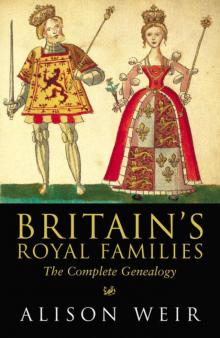 Britain's Royal Families: The Complete Genealogy
Britain's Royal Families: The Complete Genealogy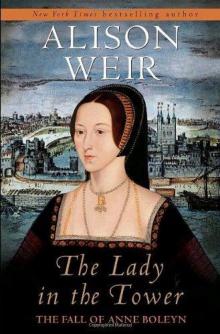 The Lady in the Tower: The Fall of Anne Boleyn
The Lady in the Tower: The Fall of Anne Boleyn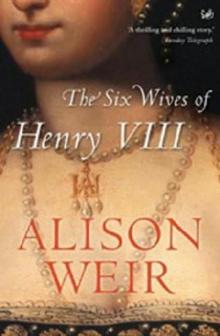 Six Wives of Henry VIII
Six Wives of Henry VIII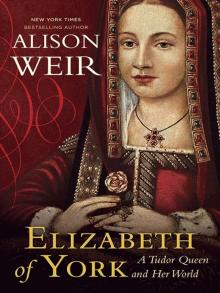 Elizabeth of York: A Tudor Queen and Her World
Elizabeth of York: A Tudor Queen and Her World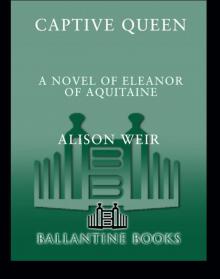 Captive Queen
Captive Queen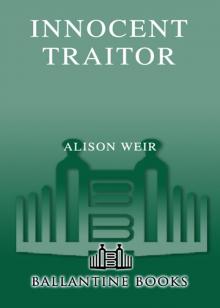 Innocent Traitor
Innocent Traitor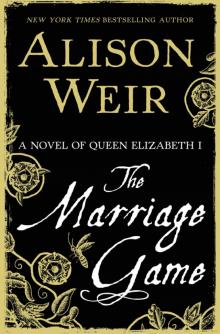 The Marriage Game
The Marriage Game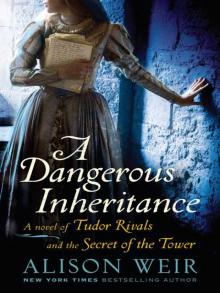 A Dangerous Inheritance
A Dangerous Inheritance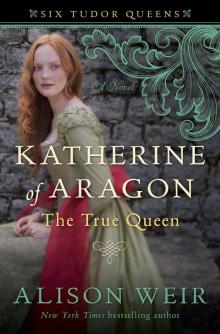 Katherine of Aragón: The True Queen
Katherine of Aragón: The True Queen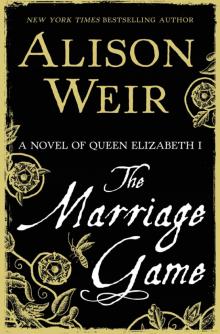 The Marriage Game: A Novel of Queen Elizabeth I
The Marriage Game: A Novel of Queen Elizabeth I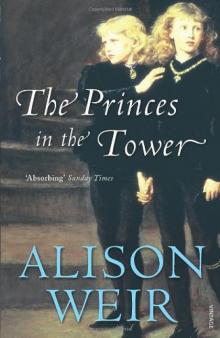 Princes in the Tower
Princes in the Tower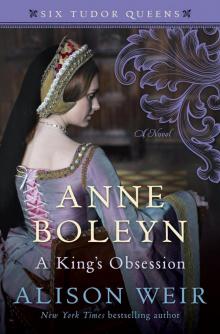 Anne Boleyn: A King's Obsession
Anne Boleyn: A King's Obsession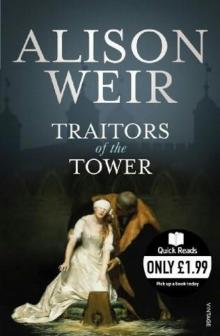 Traitors of the Tower
Traitors of the Tower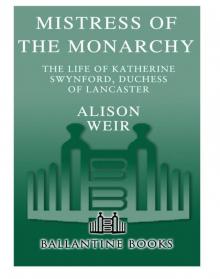 Mistress of the Monarchy: The Life of Katherine Swynford, Duchess of Lancaster
Mistress of the Monarchy: The Life of Katherine Swynford, Duchess of Lancaster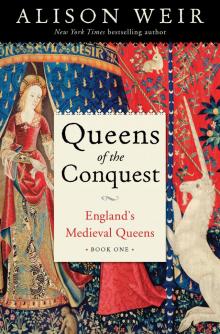 Queens of the Conquest: England’s Medieval Queens
Queens of the Conquest: England’s Medieval Queens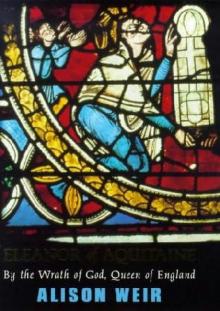 Eleanor of Aquitaine: A Life
Eleanor of Aquitaine: A Life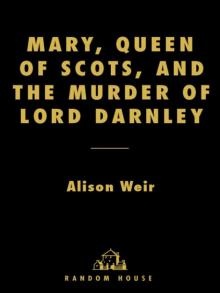 Mary, Queen of Scots, and the Murder of Lord Darnley
Mary, Queen of Scots, and the Murder of Lord Darnley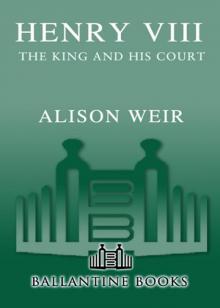 Henry VIII: The King and His Court
Henry VIII: The King and His Court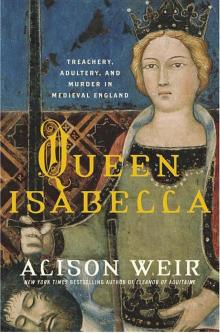 Queen Isabella: Treachery, Adultery, and Murder in Medieval England
Queen Isabella: Treachery, Adultery, and Murder in Medieval England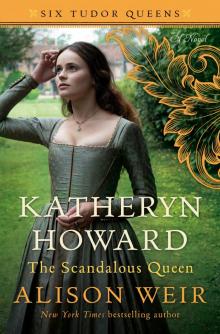 Katheryn Howard, the Scandalous Queen
Katheryn Howard, the Scandalous Queen Arthur- Prince of the Roses
Arthur- Prince of the Roses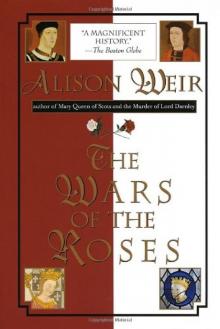 The Wars of the Roses
The Wars of the Roses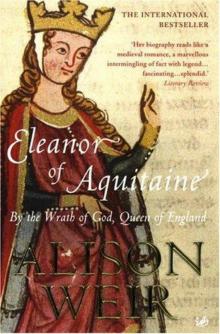 Eleanor of Aquitaine: By the Wrath of God, Queen of England
Eleanor of Aquitaine: By the Wrath of God, Queen of England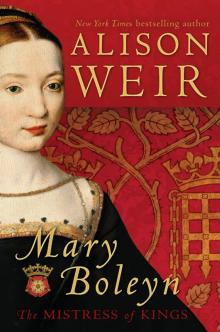 Mary Boleyn: The Great and Infamous Whore
Mary Boleyn: The Great and Infamous Whore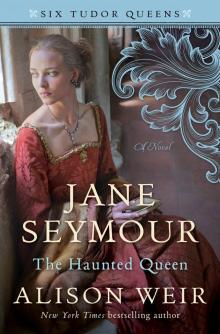 Jane Seymour: The Haunted Queen
Jane Seymour: The Haunted Queen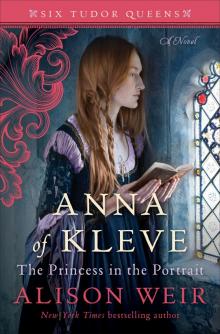 Anna of Kleve, the Princess in the Portrait
Anna of Kleve, the Princess in the Portrait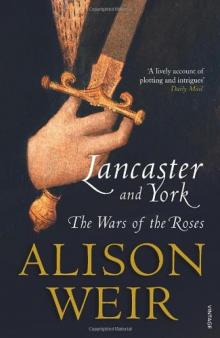 Lancaster and York: The Wars of the Roses
Lancaster and York: The Wars of the Roses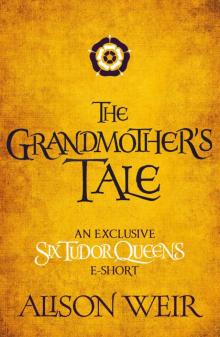 The Grandmother's Tale
The Grandmother's Tale The Princess of Scotland (Six Tudor Queens #5.5)
The Princess of Scotland (Six Tudor Queens #5.5)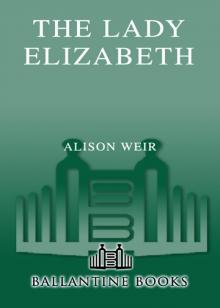 The Lady Elizabeth
The Lady Elizabeth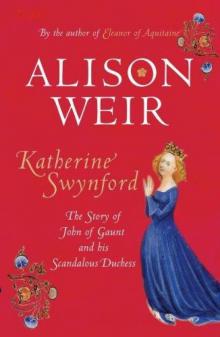 Katherine Swynford: The Story of John of Gaunt and His Scandalous Duchess
Katherine Swynford: The Story of John of Gaunt and His Scandalous Duchess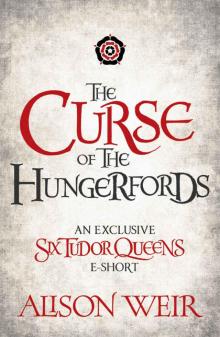 The Curse of the Hungerfords
The Curse of the Hungerfords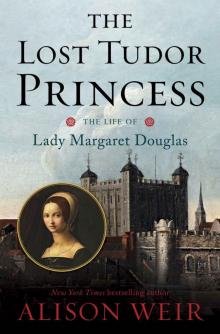 The Lost Tudor Princess: The Life of Lady Margaret Douglas
The Lost Tudor Princess: The Life of Lady Margaret Douglas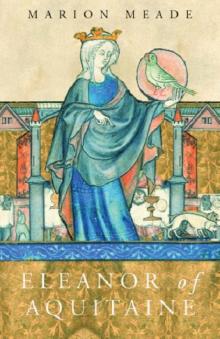 Eleanor of Aquitaine
Eleanor of Aquitaine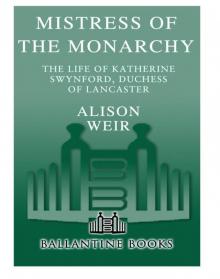 Mistress of the Monarchy
Mistress of the Monarchy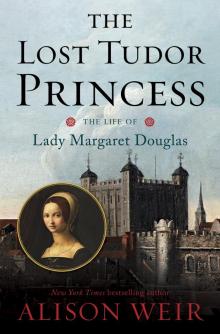 The Lost Tudor Princess
The Lost Tudor Princess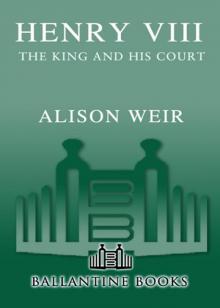 Henry VIII
Henry VIII Anne Boleyn, a King's Obsession
Anne Boleyn, a King's Obsession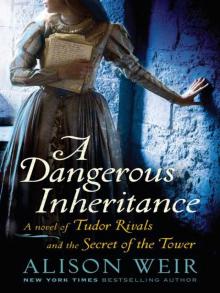 A Dangerous Inheritance: A Novel of Tudor Rivals and the Secret of the Tower
A Dangerous Inheritance: A Novel of Tudor Rivals and the Secret of the Tower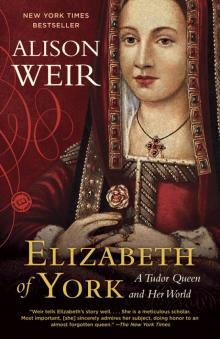 Elizabeth of York
Elizabeth of York Katherine of Aragon, the True Queen
Katherine of Aragon, the True Queen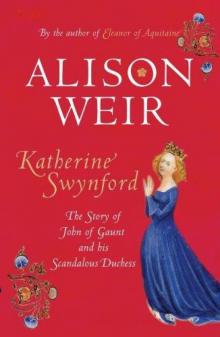 Katherine Swynford
Katherine Swynford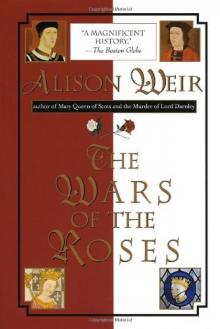 Wars of the Roses
Wars of the Roses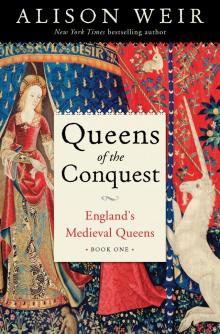 Queens of the Conquest
Queens of the Conquest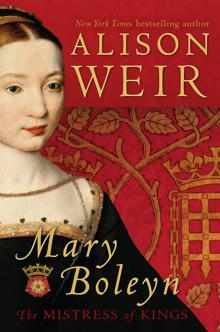 Mary Boleyn
Mary Boleyn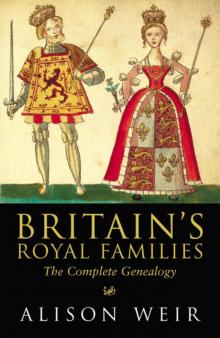 Britain's Royal Families
Britain's Royal Families The Tower Is Full of Ghosts Today
The Tower Is Full of Ghosts Today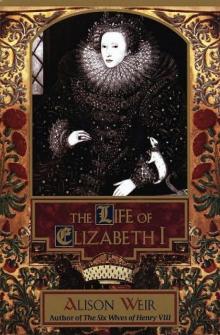 Life of Elizabeth I
Life of Elizabeth I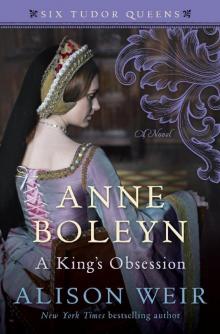 Anne Boleyn A King's Obssession
Anne Boleyn A King's Obssession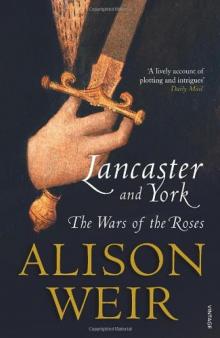 Lancaster and York
Lancaster and York Jane Seymour, the Haunted Queen
Jane Seymour, the Haunted Queen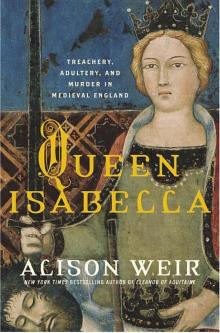 Queen Isabella
Queen Isabella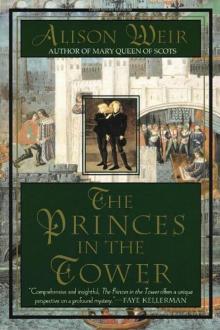 The princes in the tower
The princes in the tower